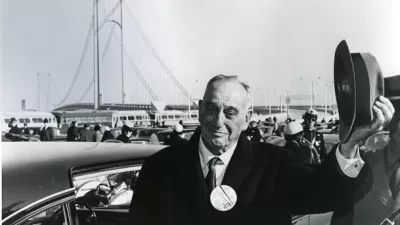Anthony Flint examines the commonalities—and disparities—in the historic legacies of Frederick Law Olmsted and Robert Moses.
For two of the most prominent figures in the history of American planning, the legacies of Frederick Law Olmsted and Robert Moses could not be much more different, yet the two had much in common. According to an article by Anthony Flint: "They both were top-down, hard-charging master planners, creatures of authorities and commissions that helped them get things done. Both perturbed by the jarring cacophony of the city, they sought the best for the American people, and produced glorious public recreation facilities known the world over. They both had a fondness for poetry, and both were accepted at Yale."
Flint's argument, however, is that Moses's strengths were traits he shared with Olmsted: "Olmsted built beautiful parkways, too, and undeniably looked at public works and city-building at a grand scale. His firm’s blueprints were wonderfully regional. He thought comprehensively, encompassing public health benefits, sanitation, circulation, and increases in property values. And he was every bit as dogged, in his own way, as Moses, willing to get his hands dirty, immersing in necessary politics, and practicing wait-them-out patience with great skill. As I’ve said myself about Moses, those are qualities we need today—a regional vision, the skill to align bureaucracies—as coastal cities attempt to build resilience and prepare for the inevitable impacts of climate change."
Moreover, although it's still common to vilify Moses as a symbol of top-down planning, to completely disregard his skill and accomplishments is still likely dangerous: "The warning is clear: the rest of the world shouldn’t fall into the same old trap and practice the top-down planning that Jacobs rebelled against a half-century ago. But it would be a shame if Moses’s excesses have permanently given large-scale planning a bad name, even as conditions on the ground warrant a more regional vision."
FULL STORY: Olmsted the Hero, Moses the Villain

Alabama: Trump Terminates Settlements for Black Communities Harmed By Raw Sewage
Trump deemed the landmark civil rights agreement “illegal DEI and environmental justice policy.”

Study: Maui’s Plan to Convert Vacation Rentals to Long-Term Housing Could Cause Nearly $1 Billion Economic Loss
The plan would reduce visitor accommodation by 25% resulting in 1,900 jobs lost.

Planetizen Federal Action Tracker
A weekly monitor of how Trump’s orders and actions are impacting planners and planning in America.

Wind Energy on the Rise Despite Federal Policy Reversal
The Trump administration is revoking federal support for renewable energy, but demand for new projects continues unabated.

Passengers Flock to Caltrain After Electrification
The new electric trains are running faster and more reliably, leading to strong ridership growth on the Bay Area rail system.

Texas Churches Rally Behind ‘Yes in God’s Back Yard’ Legislation
Religious leaders want the state to reduce zoning regulations to streamline leasing church-owned land to housing developers.
Urban Design for Planners 1: Software Tools
This six-course series explores essential urban design concepts using open source software and equips planners with the tools they need to participate fully in the urban design process.
Planning for Universal Design
Learn the tools for implementing Universal Design in planning regulations.
Caltrans
Smith Gee Studio
Institute for Housing and Urban Development Studies (IHS)
City of Grandview
Harvard GSD Executive Education
Toledo-Lucas County Plan Commissions
Salt Lake City
NYU Wagner Graduate School of Public Service





























